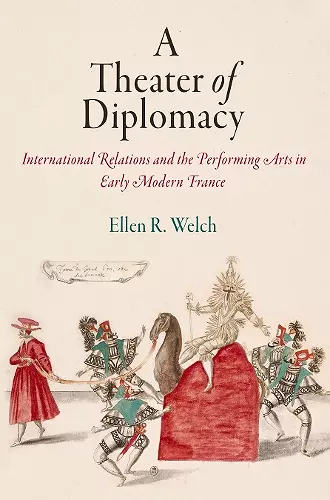A Theater of Diplomacy
International Relations and the Performing Arts in Early Modern France
Format:Hardback
Publisher:University of Pennsylvania Press
Published:3rd Apr '17
Currently unavailable, and unfortunately no date known when it will be back

In A Theater of Diplomacy, Ellen R. Welch argues that theater served not merely as a decorative accompaniment to negotiations, but rather underpinned the practices of embodied representation, performance, and spectatorship that constituted the culture of diplomacy in the early modern period.
In A Theater of Diplomacy, Ellen R. Welch argues that theater served not merely as a decorative accompaniment to negotiations, but rather underpinned the practices of embodied representation, performance, and spectatorship that constituted the culture of diplomacy in this period.
The seventeenth-century French diplomat François de Callières once wrote that "an ambassador resembles in some way an actor exposed on the stage to the eyes of the public in order to play great roles." The comparison of the diplomat to an actor became commonplace as the practice of diplomacy took hold in early modern Europe. More than an abstract metaphor, it reflected the rich culture of spectacular entertainment that was a backdrop to emissaries' day-to-day lives. Royal courts routinely honored visiting diplomats or celebrated treaty negotiations by staging grandiose performances incorporating dance, music, theater, poetry, and pageantry. These entertainments—allegorical ballets, masquerade balls, chivalric tournaments, operas, and comedies—often addressed pertinent themes such as war, peace, and international unity in their subject matter. In both practice and content, the extravagant exhibitions were fully intertwined with the culture of diplomacy. But exactly what kind of diplomatic work did these spectacles perform?
Ellen R. Welch contends that the theatrical and performing arts had a profound influence on the development of modern diplomatic practices in early modern Europe. Using France as a case study, Welch explores the interconnected histories of international relations and the theatrical and performing arts. Her book argues that theater served not merely as a decorative accompaniment to negotiations, but rather underpinned the practices of embodied representation, performance, and spectatorship that constituted the culture of diplomacy in this period. Through its examination of the early modern precursors to today's cultural diplomacy initiatives, her book investigates the various ways in which performance structures international politics still.
"This book offers a series of important and fascinating studies about the interaction between the performing arts and diplomacy. Diplomats are often described as actors on a stage; more concretely their presence was important in court festivities; such forms of entertainment could accompany diplomatic practices. Ellen Welch chooses precise examples, especially ballets, from the end of the sixteenth century up to Louis XIV's reign to feed a remarkable reflection about the art (and arts) of peace." * Renaissance Quarterly *
"Deftly situated at the crossroads of cultural, political, and aesthetic history, A Theater of Diplomacy bridges the thriving fields of performance studies and the history and theory of international relations. No single book in this arena of early modern Europe has undertaken the kind of ambitiously comprehensive synthesis, stretching across two centuries, that Welch has created here." * Larry F. Norman, author of The Shock of the Ancient: Literature and History in Early Modern France *
"Ellen Welch brings to life a world that has become almost completely foreign, while taking care to note the influence of early modern diplomacy on the spectacular statecraft of our own time. A Theater of Diplomacy is a quiet invitation to consider the importance of art and spectacle for the expression of difference and the constitution of community." * Ellen McClure, University of Illinois at Chicago *
ISBN: 9780812249002
Dimensions: unknown
Weight: unknown
312 pages